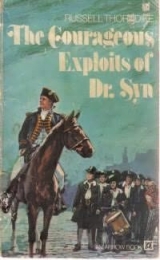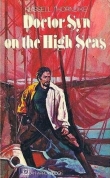
Текст книги "The COURAGEOUS EXPLOITS OF DOCTOR SYN "
Автор книги: Russell Thorndike
Жанр:
Исторические приключения
сообщить о нарушении
Текущая страница: 13 (всего у книги 16 страниц)
12
MYSTERIOUS COOPERAGE
After the death of Knarler, Doctor Syn expected his guest to keep his promise in giving him full confidence.
Captain Blain had purchased the Vicar’s silence in regard to the matter of manslaughter, with an obligation to
become his sworn ally against the Scarecrow, and yet as the days went by he kept his own consul and was more
reserved with the Vicar than he had been before.
He seemed purposely to avoid speaking of the Scarecrow, and the closer he became, the more openly did the
Vicar try to discuss. Indeed, Doctor Syn railed more than ever against the smuggling.
On the Sunday following Knarler’s death, he preached twice against the ways of wicked men, who for the sake of
gain, did not scruple to use the dreadful violence of sudden death. There had, he said, been too many tragedies upon
their beloved Marsh, because certain men upon her had feared to disobey the orders of the arch fiend in their midst,
and he urged all good Marshmen to support Captain Blain and his gallant followers, in their endeavour to stamp out
the wickedness. At the conclusion of both sermons, he called his congregation to their knees, while he extemporized
a prayer that the Captain’s efforts would be blessed with success.
No one was louder with ‘Amen’ than Mr. Mipps, who was able to appreciate the humour of the situation, though
his face showed nothing but righteous zeal for the destruction of the Scarecrow.
Since the Captain never referred to what he was himself planning, Doctor Syn,, was certain that his guest was
planning something very important.
Perhaps the Captain underestimated the Vicar’s quick instinct for reading men’s minds. He did not know that the
Vicar was studying him all the time.
The Captain, pretending to be beaten by the Scarecrow, which he would not acknowledge in his mind, was under
the impression that Doctor Syn was tricked into the belief that he could think of no plan of campaign, and was
therefore content to mark time with carrying on the ordinary routine of a ship’s company ashore. And yet as the
days passed and they faced each other over the port, an occasion when conversation was demanded between host
and guest, the Vicar could have staked his wig that Captain Blain was working secretly on lines that gave him
inward satisfaction, but which he was not willing to divulge even to his supposed ally. The closer the Captain
became, so did Doctor Syn become more communicative as to his own ideas on the subject.
Although many of these suggestions were sound and practical against the Scarecrow, the Vicar was well aware
that the Captain, although politely pretending to consider them, merely discussed them in order to dismiss them in
his own mind in favour of whatever scheme he was working upon, a scheme which he had decided not to impart to
his host.
But if he was close about his own plans, he tried hard to draw Doctor Syn into conversing about his past travels
in the Americas, which the Doctor at first thought was but politeness, until he began to wonder whether his guest
was not trying to trip him up about his past. This amused the good Doctor, for he knew that the sea-dog would have
to prove himself a lot cleverer to do that.
Doctor Syn knew how to deal with the past, but the Captain’s campaign against the Scarecrow was a vital
question of the immediate future, and it was very necessary that he should know beforehand which way the cat was
going to jump when the Captain opened the bag.
As he confessed to Mipps: “I can of course take an opportunity of accusing the Captain that he is not keeping to
his side of our bargain. If he persistently keeps me in the dark I have every excuse to do so. On the other hand, I
would prefer not to show such a curiosity. I mean, I should like to discover his scheme, whatever it may be, without
his knowledge.”
An opportunity presented itself from an unexpected quarter. It was young George Lee, the cooper, who brought
things to a head in the Vicarage, and enabled the vicar to discover and thwart the Captain’s plan.
George Lee had been one of the Doctor’s young parishioners, till he had left Dymchurch for Hythe in order to be
apprenticed to the master cooper of the brewery.
He had been most solemnly initiated according to this ancient rights known as ‘trussing the Cooper’. This
consists of squaring up a cask with the help of his master, and then laying a cresset or iron bucket, wh ich when
alight, warms the cask, and makes the staves pliable for shaping, which are then bound with the hoops and beaten
with heavy hammers. The apprentice is then ‘rung in’. This part of the ceremony is performed by hammering upon
sheet iron. At the close of this pandemonium the willing, though nervous, apprentice, allows himself to become the
victim to the masters of the craft, who bundle him, feet first, into the cask which he had helped to fashion. Gathered
around him, as he crouches in the cask, the masters hammer upon the hoops, while the ‘christening’ ceremony is
performed with sawdust, shavings and water.
The cask, still warm from the cresset, is then turned upon its side, and with the victim still inside it is rolled up
and down the length of the shop.
The apprentice is then dragged out by his ankles and tossed into the air, when, to show that there is no personal
animosity towards him, his particular master is tossed up by the same tormentors. His health is then drunk by all,
and the apprentice has become a fully-fledged cooper.
Now George Lee had recently passed though this ordeal, and was justly proud in being a real member of his
trade.
Meeting him outside the Brewery Cooperage in Hythe, Doctor Syn asked him whether he found his working
hours too long, to which the lad had replied that he only wished he could be allowed to work longer, adding that he
could forgo all recreation for the sake of his job. Therefore Doctor Syn was the more surprised to find him entering
the Vicarage gate during the morning following his meeting with him in Hythe.
“Have you then an enforced holiday, my lad?” he asked. “From what you told me yesterday, I did not expect to
see you so far from the cooper’s shop upon a working day. You want to see me, eh?” And without waiting for an
answer he added, with a smile: “I can guess at your purpose, I think. You are come to ask me to put up the banns
for you and Polly Henley, eh? You find that you are prepared to face matrimony now that you are a cooper indeed.”
The lad blushed and shook his head. “No, sir. Though in that respect I am only waiting Polly’s permission to do
so. But I did not come for that reason, though I wish I had. I am here, sir, under orders to see the naval gentleman,
called Captain Blain, who I think is staying with you, sir.”
“So you come to see my guest and not me, eh?” replied the Vicar, with another smile. “Well, I fancy you will
find him inspecting his men in the old barn. This is his usual hour for that ceremony.”
The lad thanked the Vicar, and was for passing on towards the large Tythe Barn, when the Vicar, wondering what
business could be afoot between these two, stopped him with, “Has the Captain been commissioning you to make
him a barrel, then?”
“No, sir,” replied the cooper. For a moment he paused, as though uncertain what to say next. Then he added: “It
is a business meeting, sir, which I am obliged to keep to myself, according to the Captain’s express orders. Though
to keep any secret from you, sir, seems all wrong, I admit.”
“Nonsense,” laughed the Vicar. “A promise is a promise, and a good man knows when to keep his mouth shut.
No doubt the good Captain has his reasons for secrecy, and you do quite right to respect them.”
Just then the Captain came striding out from the darkness of the barn’s great doors into the sunlight, and seeing
the Vicar talking to the lad, whom he had been expecting, he came towards them with: “Ah, so you have intercepted
my messenger from the cooperage, eh? A purely technical matter, Vicar. A contract for a sprung water-cask that
they are to put right, that’s all.”
“And you have to worry about little things like that, Captain?” asked the Doctor innocently. “I thought such
matters were arranged for you from the Supplies Office.”
“And sink me, Parson, so they should be,” responded the Captain with some warmth. “I fear they are not,
however. At least not with any satisfaction. For any immediate service I find it better to put out a job direct, and
send in the account to the Admiralty after.”
Doctor Syn made a mental note of this, and later came to the conclusion that in reality Captain Blain would do no
such thing. He knew enough of ships and shipping to be quite sure that such artic les as casks, when faulty, would be
supplied fresh from the dockyard coopers, and not from such a place as the brewery in Hythe.
“Do you mind if I take this lad into the house, so that I can refer to my order book?” asked the Captain.
“He does not wish me to overhear their conversation,” thought the Vicar. “This ‘order book’ is but a blind drawn
in front of my eyes.” Which only made him the more determined to overhear what might pass between them.
Aloud he answered: “Certainly, Captain, with all my heart. You may have the use of my study undisturbed, if you
will allow me but a minute to put on my gown to be in readiness for the reading of Morning Prayer. It is nearing my
time, for the Sexton has already gone to the church and will be sounding the ten o’clock bell in a minute or so. And
do you know, Captain, if I am not dead upon time, the old rascal will slip away quickly, glad of any excuse to escape
going through the many responses and Amens.”
Doctor Syn had already made up his mind. He led his companions to the Vicarage, entering by the front door
and not by the study garden door, at the back. In the hall he went to a side-cupboard and produced the glasses,
which he placed on the table, saying:
“I have not yet drunk our mutual friend, George Lee’s, health, since he became a master of his craft. I am sure,
Captain, you will join me in such a ceremony. I will open a bottle of sherry, for such an occasion demands the
drawing of a fresh cork, and I can leave you to finish the contents, for if I stay too long my Sexton will abandon me.
Mipps is an excellent fellow, but he had his weaknesses. As he has not yet rung the bell I am safe for a minute or so
before cutting off his retreat. You see, Captain, Mipps and I have frequent words about the necessity for carrying
through the form of Morning and Evening Prayer, when there may be no one there but ourselves. You will
understand that I am not in any way accusing my good flock of desertion, but they are busy fold upon week-days,
and more often than not, we have not three gathered together, but only two, myself and Sexton. Not being in Holy
Orders, Mipps is not obligated to say privately or publicly his Morning and Evening Form of Prayer, but I am. And
although many clergy keep their churches closed during the week, I consider such to be a breach of discipline. Just
a moment, Captain,” he laughed.
Now Mrs. Fowey was in the habit of giving Mr. Mipps just one noggin of rum before service, ‘just to give him
strength to pull the heavy bell’, she would say. So Doctor Syn knew that he could count upon finding the Sexton
performing his part of this rite in the still-room. Mipps would no more have missed that ceremony than he would
have missed accompanying the Vicar through the toils and trial of a Daily Service.
So now to the still-room Doctor Syn hurried, and found Mipps sitting by the rum barrel, with a pannikin in his
hand, and being watched over by the housekeeper who wished to see that he did not help himself to a further
allowance, which he would assuredly have done if left to his own devices.
“Ah, Mipps,” exclaimed the vicar pleasantly. “ I think it is nearing the time to ring the bell. I must go and robe.
I am glad to see that Mrs. Fowey is fortifying you to pull the bell rope. But before I go to the study there is just
something I wish to point out to you in the kitchen garden. Oh, Mrs. Fowey, pray take your keys to the wine cellar
and fetch me a bottle of sherry for the Captain and his guest. I find I could do with a glassful myself. I fear I an not
so partial to rum as our good Sexton is.”
As Mrs. Fowey strode away, Mipps favoured his master with a sly wink behind his back.
No sooner had the housekeeper taken herself from earshot than the Vicar whispered quickly: “Slip into the study
by the garden door, Mipps. Conceal yourself in the usual spot behind the cloaks hanging in the alcove. I want you
to listen to whatever the Captain is about to say to young George Lee, the cooper, who has come up to see him for
some reason. That reason we have got to discover. It is very vital. Remember, he is making those special casks to
the Scarecrow’s orders, and before those casks are used for the purpose for which they have been planned, we must
know exactly how much the Captain knows, and whether it has anything to do with the peculiarity of those casks.
Now, Mipps, remember, if by ill-chance he should discover you eavesdropping behind the cloaks, you must be
asleep and very drunk. Then I shall reprimand you. The old dodge which has worked well before this.”
Mipps nodded. “He may or mayn’t look into the alcove, sir. In any case I shall be ready for him.
“I don’t think he will,” said Syn. “He will think you are at the church, and when he hears the bell, which I shall
ring directly I get there, he will think you are safely out of the way. Make haste now.”
Mipps went out to the garden, while the Vicar followed his housekeeper into the wine cellar with a “Make haste,
my good woman.”
Armed with the bottle of sherry he returned to the hall.
“Here you are, Captain,” he said, putting the bottle on the table and laying a corkscrew beside it.
“Now while I put on my gown for church perhaps you, George, will draw that cork, and perhaps you, Captain
will fill the glasses. At the risk of being abandoned by Mipps I will have a glass before I set off.”
Having set them both a task which would keep them for the moment in the hall, the Vicar went towards the study
door, taking off his long black jacket as he went. There was a hook upon the back of the door, so that he had every
excuse to close the door in reaching for the peg.
Meanwhile George pulled the cork, and then the Captain signed to him to fill the glasses too.
In the study Doctor Syn saw that the garden door was fastened, and as he unhooked his Geneva gown, he was
amused to see Mipps peeping out at him from the voluminous folds of cloaks and cassocks that hung in the alcove.
Mipps not only grinned, but winked, and then pulled a face of a drunkard feeling sleepy. Syn nodded approval and
the folds fell back and covered Mipps.
This same hiding-place having served the rascals well in the past, caused the Vicar no anxiety, so that he did not
bother to look down to see whether or no Mipps was fully concealed, for he knew that the riding cloaks were very
ling and full, reaching the floor. Indeed he knew that his henchman was so well hidden that he purposely left the
curtains drawn back, in order to appear the less suspicious.
Having pulled on his gown, he picked up a Bible from his table. Not that he would need this for reading from,
since he would use the large one upon the pulpit cushion, but he thought it would lend a further tone of piety which
would be good for the Captain to see. He realized that it would be policy to play the good man automatically on
every occasion, since the Captain was not above suspecting even him.
Leaving the study door wide open he rejoined the others in the hall.
“Ah, I see that the glasses are charged. Splendid,” he cried. “You are thirstily awaiting me to propose friend
George’s health, with a hope that he may have a long life in a settled trade.” He picked up his glass. “I do wish you
and honoured career, George, from my heart. Take after your grandfather and father in the business and you’ll come
to no harm. Also think sometimes of the teachings I was able to give you here, when you were a lad. Here’s to you,
George. You were a good boy, and I know you are now going to be a good man. Remember, too, the slogan of the
Marsh: ‘Serve God. Honour the King. But first, Maintain the Wall.’ And the last sentence means this, my lad.
You must not only protect your home by maintaining the sea-wall with your strength and courage, but you must
cheerfully pay such scotts as are imposed upon you by the Lords of the Level. And lastly, bear in mind that I
christened you at the Dymchurch font with His Majesty’s own name, and so you must obey his Government, as well
as that of the Marsh.”
“And have naught to do with the wicked smugglers, eh, Vicar,” laughingly added the Captain, as he raised his
glass to the cooper.
The Doctor shook his head. “I do not think that our young friend here will do aught to hinder the Revenue
officers in their duty, eh, George? But I must be off, and at once. Recharge your glasses and carry them into the
study where you can discuss your business undisturbed.”
“Aye, it’s good sherry,” said the Captain. “So fill up, Master Cooper, and let us accept the Vicar’s hospitality.
You will not take another glass yourself, Parson?”
“Good heavens, no,” he replied, as though horrified at the idea. “I have a service to read, and who knows? There
might be something of a congregation after all, and I assure you that some of our parochial ladies can be very
quizzical.”
As the laughing Vicar let himself out of the front door he had the satisfaction to seeing the Captain signing to
George Lee to follow him into the study. Now he would soon know the Captain’s business with the young cooper.
There happened to be no one about in the churchyard, and he know that the study windows had no view of it, so
he ran across to the church, which he found empty, and pulled the bell rope three or four times, in order to give the
Captain reminder that the Sexton was in the church. He then proceeded to the pulpit and began the service by
himself, though shortly after he had started Lady Cobtree tiptoed in and supported him by reading the responses.
Meanwhile Mipps sat hunched up in the alcove. He heard the Captain come in with George Lee and close the
door, and much to his relief heard also the noise of them both sitting in the Doctor’s chairs.
“I am glad you took my warning seriously,” began the Captain. “It shows you to be a young man of sense. You
have now passed your apprenticeship, and have begun to take your place amongst your fellow-craftsmen. Well, I
assure you that I have no wish to interrupt your career, though should you disobey my orders I shall not hesitate to
have you pressed for naval service. You are a likely lad, and cooperage is a valuable asset on any ship. There
would be no marrying with a Dymchurch lass then, for many a long year, and all the time you would be haunted
with the thought that in your very prolonged absence the girl might have married another. So kindly answer my
questions truthfully, and whatever I say keep strictly to yourself.”
“I have every wish to be of service to the Government, sir,” replied George Lee, is a voice which disgusted the
listening Mipps because of its timidity. In truth the young cooper felt strangely nervous now that Doctor Syn had
gone. He went on speaking slowly and humbly. “You heard our good Doctor Syn advise me so to do always, and I
have tried to follow his advice. When I have succeeded in doing so only good has come of it, I assure you, sir.”
The Captain grunted his approval to this sentiment, and continued: “Well, to begin with, perhaps you have been
wondering why I watched you the other day at your work in the coopers’ shop. It was chance that I happened to
pick on you. I was determined to pick on whoever seemed most to wish to stick to his work in Hythe. A few
questions about you, and I knew that you were happy and in love, and I recognized that you were the youngster who
fitted in best with my plan. That has been, perhaps, an ill-chance for you. But my reason for going to the coopers’
shop in the first place was not chance. I went there because I had had it brought to my notice that the Sexton of
Dymchurch had visited the shop several times recently.
“Now, between ourselves, as all this conversation must be, please, I had kept a weather eye on him for some
time, and he struck me as being a little man who could not keep that long, sharp nose of his out of any business. So,
thought I, why should he not have poked it into this smuggling business? The moment I suspected him I set one of
my men to watch him, and so checked up upon his goings and comings.”
“Amongst other things I learnt that he had entered the coopers’ shop several times, and I wondered whether he
was carrying orders from the Scarecrow. No sooner had this idea occurred to me than I determined to pay a
personal visit to the brewery, vowing that I would select an ally there to work for me: someone whom I could
persuade to discover for me the purpose of the Sexton’s visits. You were my selection. And now all you have to do
is to tell me just what you know.”
“Nothing, sir,” replied George Lee timidly.
“That is very unfortunate,” said the Captain slowly, adding the significant words, “for you.”
“I wish to get no one into trouble, sir,” faltered the cooper. “And least of all Mr. Mipps, who has always been
good to me. It would be a dreadful thing to feel that one had sent an innocent man to the ordeal of a trial, and all
that sort of torture, just because one may have thought things.”
“Ah, and so you have ‘thought things’, eh? Rapped out the Captain with great emphasis upon the repetition. “I
should like to know exactly what things you have thought, in order to save me from doing such a ‘dreadful thing’ as
punishing you, an innocent lad, because I must take all possible steps to put down the enemies of the Crown. Now,
come along. Be sensible, and speak up.”
“Well, I think, sir,” stammered the unfortunate cooper, “that it is permissible for my masters to make casks to an
order without asking the purchaser for what purpose those casks are needed. That would surely be, sir, an
inquisitive sort of trading?”
“You are prevaricating, my young friend,” said the Captain gravely. “My business is to stamp out smuggling.
Others have failed to do so. I am going to succeed. And with that end in view, I shall not hesitate to be, and to
make others, inquisitive to a degree. It is only by the inquisitiveness of every good citizen concerned that my object
can be obtained. If I had my will not a barrel should be sold by firms like yours, unless that barrel had a clear port
of call, as it were. I am confident that if the Scarecrow has placed an order with your firm, through the medium of
Mipps, that your firm will know what Mipps wants them for.
“Now just to show you that once I have made up my mind to a thing, nobody will swerve me from attaining it,
I’ll tell you how I found the means to interview your head cooper. I ordered my Bos’n to spring a leak in one of our
water-casks, and then told him to carry it to your shop for mending. This gave me the excuse for visiting your
people. I called in to inquire if they could hurry with the job and what price my Bos’n had agreed on, saying I had
to watch the leakages of money as sharply as leaky water-casks.
“I then expressed a lively interest in the mystery of cooperage, a craft that runs close along the art of ships-andboat-building, which I have studied since I first took to the sea. Many a seafaring man sees no romance in the
history of ships. To me a ship or boat is a romantic creation, and I have interested myself in each part of every craft
I have sailed. And all the accessories of a vessel, too, such as ropes, casks, barrels and kegs. Sails, too. There’s
little I cannot tell about canvas. The carrying of cooper upon every ship under my command made me wish to learn
something of his trade, so that I could judge of his work and any difficulties that might arise. And that there were
many difficulties upon a fighting ship I very soon did appreciate.”
“I am not boasting that I could make a cask, for I could not, because, unlike you, I have not the advantage of five
years’ concentration upon it. But I know as much as you do about the job in theory. Perhaps a little more. Can you,
for instance, tell me anything of the history of cooperage?”
Glad enough to talk of anything that did not necessitate telling tales, the cooper answered cheerfully: “Yes, sir,
as little. It wan an honoured calling in the City of London as far back as the thirteenth century, and according to old
Acts of Parliament, coopers were called ‘good men of the mystery of coopers’, and in the fifteenth century every
cooper had to have his own mark, same as the stonemasons did.”
The Captain nodded. “And that raises an important point. It is the custom still to put your mark upon a cask you
make. Now suppose the tub, barrel, keg or cask is designed for some illegal work, such as smuggling, is the mark
still put upon it by the good man cooper?”
“Well, sir,” replied the cooper, becoming uneasy again, “if I make a cask I put my mark upon it in the ordinary
way, and, at our shop, the head master-cooper puts his too, which shows that it has been passed with tests as the best
our shop can turn out.”
“I see,” nodded the Captain. “And suppose I find tubs containing smuggled goods with your mark upon them,
can I discover from any cooper that you were the maker? For I should wish to question you.”
“Most likely, sir, since all our marks are registered in the trade,” replied the cooper, wondering where the Captain
was leading him. “No doubt, sir,’ he added, “if you were to find smuggled goods in a cask I made, I could tell you
to whom that cask had been sold, and would be justified in doing so, but that would surly, sir, be the end of my
responsibility, except that it would have been guaranteed as a good cask, carrying with it an endurance test from the
shop.”
“Very well, then,” cried the Captain. “Call your mind back to my visit. You remember that I sat in your part of
the shop and watched you for some time at work, while my guide had gone to inquire about my cask? Well, now,
what did I tell you?”
“You hinted, sit,” replied the cooper with a fresh show of fear in his voice, “that if I wanted to escape the penalty
of being pressed for service at sea, I was to call upon you here this morning, and not to let the other coopers know
my destination. I made a good enough excuse for getting the morning off, sir, and her I am.”
“And you are no doubt curious as to how you can serve His Majesty through me, eh?” asked the Captain.
The cooper nodded.
The Captain continued: “I saw you working upon what I knew was a finished barrel. You were adding to it.
You were fitting in straight staves from the top to the bottom. I thought this queer, and asked you why you were
doing it. You said you were carrying out a special order: that the peculiar fashioning of that cask had been
requisitioned, and you explained that it must be for packing something or other that did not need the bulge of a
regular tub.”
“That is so, sir, and that was all I knew of the matter,” answered the cooper.
“Well, you must see to it that you know more about it in the next few days if you want to remain ashore,” said the
Captain. “Your liberty, which I take it you value, depends upon your finding out who is to receive that tub, and if
there are to be more of them made in that odd fashion. You must also discover whether these casks or that cask are
to be sent across Channel, what is going to be put into them, and whether they a re coming back again to this coast.
You will also find out why the contents have to be packed between staves unbent, and why they have to be put into
an outwardly curved cask.”
“Your last question is obvious, sir,” replied the cooper. “The advantage of the curve outside a barrel makes it
easier for rolling.”
“True enough. A good answer,” said the Captain with a note of approval. “But I suggest to you that the space
occasioned between the outer barrel and the straight staves could carry a very considerable quantity of tightly
pressed tobacco, for instance. The customs would open the top, and under the lid see nothing but the cargo which
had been duly declared.”
“Which in this case, sir, would be ‘bones’,” explained the cooper.
“Bones?” queried the Captain.
“I don’t know why a large consignment of bones has to be shipped across the water, or that use they will put
them. A mate I work with said something about bones being useful to farmers, who have some process of crushing
them and using the powder obtained as a fertilizer for the soil. I never heard tell of that before.”
“Very good,” exclaimed the Captain. “We must then keep a weather eye open for the arrival of these bones,
which will no doubt be the cause of stringing up some farmers’ bones upon the Marsh. Farmers on the Marsh want
bones, do they? I think the crows about here will be pecking at their own bones, too. And ordered by the Sexton.
This is becoming interesting, George Lee.”
“I think, sir, that you are wronging Mr. Mipps by suspecting him,” put in the cooper. “I have known the Sexton
all my life, and a kinder man you could not wish to find upon the Marsh. You accuse him of poking his nose into
other people’s advantage. He is one of those men who is always doing things for others. If Doctor Syn should send
him on an errand to Hythe, why cannot he execute an order for a farmer friend at the same time? A farmer is a busy
man, sir, in these parts, and would value the Sexton’s help.”
“The farmers here are very busy, I can well believe,” retorted the Captain. “Especially those who work for the
Scarecrow at night. But that is beside the mark at the moment, though there will come a time, and at no great
distance, when these same farmers will be swinging as scarecrows above their own fields.”
“I hope not, sir,” replied the cooper. “I hope they are not so wicked as to serve under the Scarecrow.”








